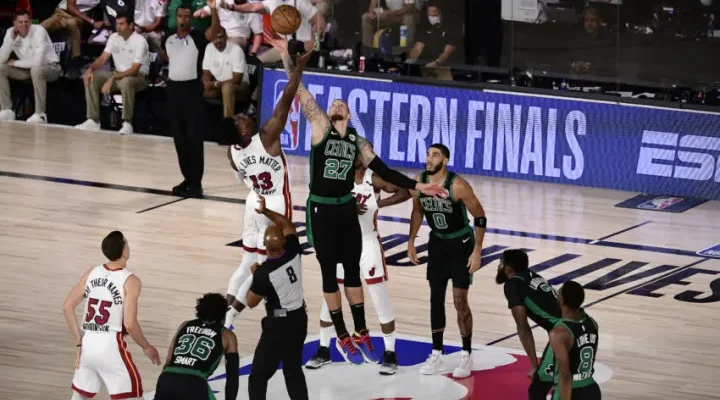Boston Celtics Closed Their Pandemic‑Halted 2019–20 Regular Season with Resilience and Depth in Orlando Bubble Finale versus Wizards
It was August 13, 2020—the date often overshadowed by headlines of playoff pushes and championship pursuits. But for the Celtics, it marked something different: the final act of a season that had stretched and bent under extraordinary circumstances. The 2019–20 regular season, initially derailed in March, had resumed more than four months later—inside the NBA Bubble at Walt Disney World’s Wide World of Sports Complex in Orlando. It was a surreal setting with no cheering crowds, just echoes and quiet determination permeating empty stands .
By that point in the Bubble, the Celtics had wrapped up their seeding games—eight in total—to finalize playoff positioning. The concluding matchup was against the Washington Wizards, a game that could have felt routine under normal circumstances but instead carried symbolic weight. This was the last regular season contest—game number 72 for the Celtics—heralding the start of the postseason that very next week .
But there was something different about this finale: Boston chose to rest its starters. With playoff seeding already locked, and the collective aim being to preserve health and stamina for the looming postseason gauntlet, coach Brad Stevens turned to his reserves. The bench-heavy roster took the floor with youthful energy and grit, intent on closing this febrile season on a note of perseverance rather than panic.
That decision elevated the spotlight onto players who had not often carried the load. Javonte Green, a reserve wing, became the offensive spark, pouring in a season‑high 23 points. His effort was spirited and efficient, playing with an urgency that spoke to both opportunity and professionalism. Alongside him, Vincent Poirier and other depth players rotated, offering contributions on both ends of the court .
Washington’s Troy Brown Jr. countered Boston’s effort with an impressive stat line: 17 points and 8 rebounds. But it was the Wizards’ big man who arguably stole the night with a career‑defining performance—26 points, 9 rebounds, 2 assists, and 4 steals. He matched Boston’s hustle and prowess in his own concentrated burst of energy .
The game, however, was not pretty in terms of shooting. Both teams struggled to crack 40 percent from the field—each possession felt labored, each basket hard-earned. Yet in that struggle lay the defining quality of the evening: resolve. It wasn’t about perfection—it was about finishing what had become an odyssey for every team in the league .
Afterwards, Brad Stevens highlighted the depth effort. He praised the intensity and focus of the reserves and noted how they reshaped expectations under trying conditions. In a season bookended by tragedy, uncertainty, and a public health crisis, the Celtics had found a way to finish strong—even if the performance didn’t look like their best on paper.
To fully grasp the emotional and developmental gravity of August 13, 2020, you have to understand the broader arc. The season had started in October 2019 with high hopes—Kemba Walker had joined to fill Kyrie Irving’s shoes, and Jayson Tatum and Jaylen Brown were carving out rising-star narratives. But in March, the world shut down. The league paused play on March 11, 2020, following a positive COVID‑19 test by Rudy Gobert. Marcus Smart of the Celtics also tested positive shortly after.
Months of uncertainty passed. Games were canceled, fans scattered, entire businesses shuttered. Yet in Orlando, the NBA fashioned a bubble—an isolated ecosystem where players could resume play safely. The league’s return started in late July. The Celtics, like other top teams, played eight seeding games not to chase wins per se, but to earn a playoff spot and maintain competitive edge .
So when August 13 arrived, it signaled not just an end of a chapter, but a transition—the starting line for whatever came next: the intensity of the postseason. While the Celtics ultimately advanced and made a deep run to the Eastern Conference Finals before falling to the Miami Heat, this regular season finale was the closing overture—a moment of quiet closure before the storm.
The nuances around resting the starters also reveal strategic foresight. With seeding locked, there was no reason to risk fatigue—or worse, injury. Yet bench players embraced the opportunity—not merely to rehearse, but to perform. Javonte Green’s scoring outburst and the collective tenacity embodied what many fans respect about Boston basketball: even the unsung players know how to rise when called upon.
For Celtics fans, the game lacked the flash of Jaylen Brown’s mid‑February buzzer‑beater or Jayson Tatum’s scoring outbursts earlier in the season. But it represented something equally vital: adaptability. They had battled through disrupted routines, virus exposure, isolation, even personal uncertainty. This last regular season game was a quiet testament—not to the glamour of superstars—but to the resilience of the group.
In reflecting on this game, it’s easy to see parallels between the arc of that season for Boston and for many across the world. Interrupted plans, rerouted roads, and eventually, a deliberate finish. The last regular season game wasn’t about the scoreboard—it was a declaration: we endured. We are here. Now, onward to the challenge.



